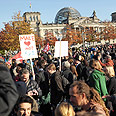
Berlin Biennale: Art meets politics
Photo: EPA
Hundreds of birch trees from the biggest Nazi death camp, at Auschwitz-Birkenau
in Poland, are dotted around Berlin as a living memorial of this dark chapter in Germany's past.
The trees, called Birke in German, lent their name to the Birkenau camp where as many as 1.5 million people, mostly Jews, perished between 1940 and 1945.
Exhibition
Vlad Solomon
Jerusalem exhibition tries to answer poignant question about Avant-Garde artists from Romania
The installation "Berlin-Birkenau" by Polish artist Lukasz Surowiec, 26, is part of the Berlin Biennale, a contemporary arts festival devoted this year to political art.
"This is an attempt to create a new kind of monument - a living monument," said Surowiec, who has had commemorative plaques erected in front of the trees. "With the help of nature, I try to continue a generational mission of deepening the memory of the victims of the Holocaust.
"My project is effectively based on giving back the 'inheritance' (of the camps) to its owners."
Biennale director Artur Zmijewski, also Polish, says it seems paradoxical to his compatriots that a place where Germans committed one of the worst crimes against humanity is not in Germany, but in Poland.
This installation, one of many at the Biennale which is not confined to a gallery or museum, is therefore partly about the "politics of history", he said.
The Holocaust and the Palestinian territories are strong themes at the Biennale this year, which is run by the contemporary art centre KW in former East Berlin but sprawls throughout the entire city.
Jewish return
The Berlin Biennale was founded in 1998, inspired by the Venice Biennale, and aims to showcase little established young artists and provide a forum for experimentation.
The seventh edition officially opens on April 27 and runs through until July 1, but many projects such as Surowiec's are already taking place. Zmijewski, 45, has said he wants "the exhibition to become a political space that resembles a parliament more than a museum".
Israeli artist Yael Bartana, 41, will hold the "First International Congress of The Jewish Renaissance Movement", a symbolic project calling for the return of Jews to Poland that she created through video artwork.
"We call for the return of 3.3 million Jews to Poland to symbolize the possibility of our collective imagination - to right the wrongs history has imposed," Bartana says.
From May 11-13, she hosts a "parliamentary debate" on the questions: "How should the EU change in order to welcome the Other? How should Poland change within a re-imagined EU? How should Israel change to become part of the Middle East?"
Palestinian Khaled Jarrar, used the Biennale to develop his artist-activist project staking out Palestinians' right to a sovereign state.
Jarrar, 36, shot to international prominence last year by offering unofficial passport stamps of his own design to foreigners arriving in the occupied territories.
For the Biennale, he created a postage stamp for the "State of Palestine" with a drawing of the Palestine Sun Bird flying near delicate flowers.
The stamp was issued by Deutsche Post and can be used in the regular mail. More than 20,000 stamps have been sold so far.
"After I printed official post stamps in Germany and Netherlands, people started using these stamps to send letters all over the world," he wrote in an email.
"We are not allowed in the Palestinian post office to print postage stamps with the words 'State of Palestine'."
Jarrar said he felt artists should be politically engaged and not just leave it up to politicians to act.
"We should think and work hard to speak out against injustice," he said. "We should make art that will make a difference."
Reuters contributed to the report















